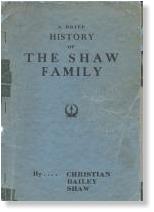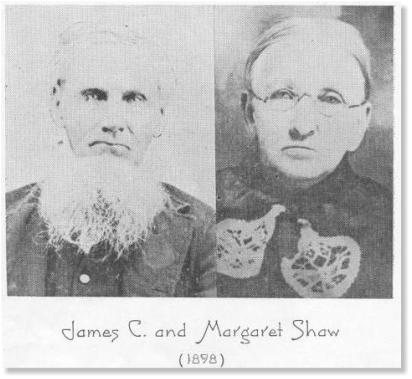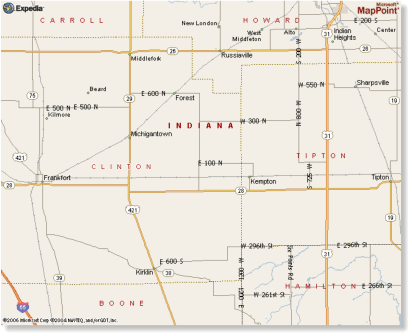
James C. and Margaret

(See Jan Rader's detailed history)
James Calvin, oldest son of Isaac and Nancy Ann Shaw, spent his boyhood days in the home of his parents in the different places in which they had lived in almost a direct westerly line from near Economy in Wayne County, through Henry County until they reached the southern part of Madison County, Indiana. As you will recall, he was much less than a year old when his parents reached Wayne County from Surry County, North Carolina, where he was born.
He received his education mostly in the School of Experience and in the main department of that school which was the Department of Hard Knocks. He very early learned to pull the end of the cross-cut across the end of the logs with alacrity with his father at the other end of the saw, to wield the ax in the clearing of the land or cutting the fire wood, the hoe in helping to cultivate the little crop of corn and vegetables, or when he got large and strong enough to raise the big knot maul high enough to drive the iron wedge and big wooden glut into the log with enough force to split it into rails with which to fence their little cleared patches of grain or vegetables, or for a neighbor for pay.
The pay mentioned above was from two-bits or 25c to three-bits or four-bits a day and the U. S. mint at that time coined a half-cent piece, so in that way exact change could be made in paying the three-bits or 37 ½ cents. Or to wield the small hand sickle they used in those days to harvest their grain, and later on when the large hand propelled grain cradle came iuto use for the same purpose, to manipulate it with dexterity and dispatch or a little later when they got the higher points of the land pretty well cleared out and they cleared up a lower piece of more fertile land that needed drainage, to take his spade and shovel in hand and throw out the ditches, or as his strength increased, to take hold of the end or the hand spike and help to carry the heavy logs together in piles so they could be burned off the land to be put into crops. Much timber was burned in that way then that would bring in good money today.
All this he graduated from with high honors, and he lost no time after his graduation but continued right on from before day until after dark, many times working at night, branding up log heaps by the light of their own glare. All this he did while at home with his parents and continued to do after his marriage, up to the time when he entered the Civil War, in the counties mentioned and then so much of it after the war on the home in Clinton County where he spent the rest of his life.
By this the writer would not have you think that James Calvin's father was a hard master, far from it. It was only the common lot of boys and men on the farms rather clearings, in those days. He spoke so many times of his father's kindness, but firmness, his father taking the hardest part of things upon himself and placing no undue burden nor hardships upon his family.
In the year 1848, he was married to Eliza Manning, who had come with her parents in an early day from West Moreland County, Pennsylvania, and settled near Milner's Corner, Hancock County. Thus the Pennsylvania German blood soon began to course through the veins of their descendants. To them five children were born: William F., January 30, 1850; Ann Catherine, January 20, 1852; John D., August 17, 1854; Joseph M., September 27, 1856; James I., May 15, 1859.
| William F. January 30, 1850 |
Ann Catherine January 20, 1852 |
John D. August 17, 1854 |
Joseph M. September 27, 1856 |
James I. May 15, 1859 |
They lived in Hancock and Madison Counties until the end of the second year of the Civil War, when he enlisted and went as a recruit with his brother-in-law, Joel Manning to Company K, 8th Regiment, Indiana Volunteers Infantry. He served in the army from 1862 until the close of the war in 1865, three years in the hottest of the war. He was with Grant in the siege of Vicksburg, was on the coast of Texas, and in different places in Alabama, Mississippi, Louisiana, Arkansas and Missouri. The writer has heard him many times speak of West Plains, little thinking that he (the writer) would ever have his home there, many years afterward.
His wife died in 1863 while conditions were so tense in the war that he could get no furlough home, so he never saw her after leaving her and his five small children on entering the army. Those were trying times, indeed.
After being discharged from the army, at the close of the war, he returned to Hancock County, and remained there until leaving there for Howard County in the fall of 1865. On October 10, 1865, he was married to Margaret Fritz, who also had come to Indiana with her parents, Christian and Catherine (Shultz) Fritz, from Somerset County, Pennsylvania, and settled near New London, Howard County, only a very few years after the first white settlement in that County, thus perpetuating the Pennsylvania German blood in the family. Christian Fritz became a large landholder, noted for his hospitality and the great number of fat, sleek farm animals kept on his farms.
James C., and Margaret Shaw were the parents of eight children: Margaret E, born August 5, 1866; Christian B., born November 25, 1867; Luther H., born January 24, 1870; Rosa M. M., born February 7, 1871; Monroe C., born July 22, 1872; Lewis L., born December 5, 1874; Howard A., born April 10, 1876; Letitia May, born July 1, 1882. Five of these grew to manhood and womanhood, three, Margaret E., Luther H, and Lewis L., passed away when small. Josiah H. Carter is an older son of Margaret Shaw, born near New London, Howard County, June 12, 1859.
| Christian B. November 25, 1867 |
Rosa M. M. February 7, 1871 |
Monroe C. July 22, 1872 |
Howard A. April 10, 1876 |
Letitia May July 1, 1882 |
Shortly after their marriage they went to the northern part of Hancock County, where James Calvin had contracted to clear a ten acre plot of ground of the timber so that it could be put into crops. He completed this lob with the aid of his older boys during the winter and early spring. Early in April they loaded their few household goods into the big farm wagon, along with the family and plodded through the mud a distance of about seventy miles, camping out at night for three days. They went almost due north and then west until they came to their destination, to avoid coming through Tipton County, where the roads at that time were almost impassable in the spring on account of the low, flat, black surface. They finally landed on April 15, 1866, at their home in the northeast corner of Clinton County, three miles west of Russiaville where they continued to reside until the time of both of their deaths.
 The farm was mostly in timber when they moved there and a very great part of it was low land requiring drainage. He set about it with his unusual industry and indomitable perseverenec with the help of the boys to clear the land, drain it and make it ready for crops, and in the passing of years, he had it all accomplished, all cleared, well drained and all fine farm land with a good house and barn on it.
The farm was mostly in timber when they moved there and a very great part of it was low land requiring drainage. He set about it with his unusual industry and indomitable perseverenec with the help of the boys to clear the land, drain it and make it ready for crops, and in the passing of years, he had it all accomplished, all cleared, well drained and all fine farm land with a good house and barn on it.Besides his regular farm work each year and his clearing, ditching and draining and otherwise improving his farm he spent several years in season in operating one of those primitive grain thrashing machines operated by horsepower, six horses part of the time and eight at other times, having at different times the two types of power. Some years, during the winter season, he utilized the horse-power in operating what is known as a drag-saw in cutting wood for himself and for the neighbors for hire. The saw was propelled by the power horizontally across the log with a backward and forward motion cutting off the blocks. Also during the winter he would spend a great deal of time hauling saw-logs to the mill to be made into lumber, using a mud-boat or a bob-sled when snow was on. In addition to all this he conducted a sorghum factory in the fall for several years making sorghum for the neighbors for miles around. The writer remembers very distinctly his part in feeding the stalks of cane into the mill to have the juice crushed out. He also remembers how we used the same furnace in the spring for boiling the maple sap into syrup or making it into sugar.
To show this unceasing spirit of industry and perseverence of his, we will relate the story of one piece of work he did after reaching the age of sixty years. The whole south end of the farm is low and was then undrained. The natural slope of the land went to the east through a neighbor's farm, then back eighty rods to the north and then to the west into a main open drainage ditch on his own farm. Rather than displease his neighbor on the east by cutting into his drain, he started at that point of the open drainage ditch at his east line and cut a ditch with his spade and shovel, extending the eighty rods south, directly along his own east line to the low land on the south. By cutting it along that direct line he had to pass through higher land where the top of the bank was higher than his head in the deepest places when he was working down in the ditch. There was also danger of it caving in on him in those deepest places, as there was much quicksand in places beneath the surface. But he toiled on day by day until he finished it, laid the tiling in and covered it up, and thus his last big job of drainage was completed. What a lesson in industry, grit and perseverence this tusk of his should teach us! Many persons today cannot realize it.
James C., and Margaret Shaw both bore the esteem and the respect of their neighbors to an unusual degree, being familiarly called by the titles so much used in those days to denote respect and affection for older persons, of Uncle Jimmy and Aunt Margaret, or sometimes Aunt Peggy. This respect was especially marked among the young people to whom they had endeared themselves by their kindly hearing and their encouraging counsel to them. They had been members of the Middlefork Baptist Church for many years until the building in their immediate neighborhood of the Cloverdale M. E. Church, with which they then placed their membership. They gave liberally of their earthly substance for the building of the church and continued cheerful givers for its support and lived consistent with its teachings until their passing away.
Father Shaw was called to his reward on April 8, 1901. Mother Shaw then resided there with her son, Howard and family, who now had charge of the home until her death, March 11, 1906. They are both laid to rest in the Russiaville Cemetery.
Back to Index